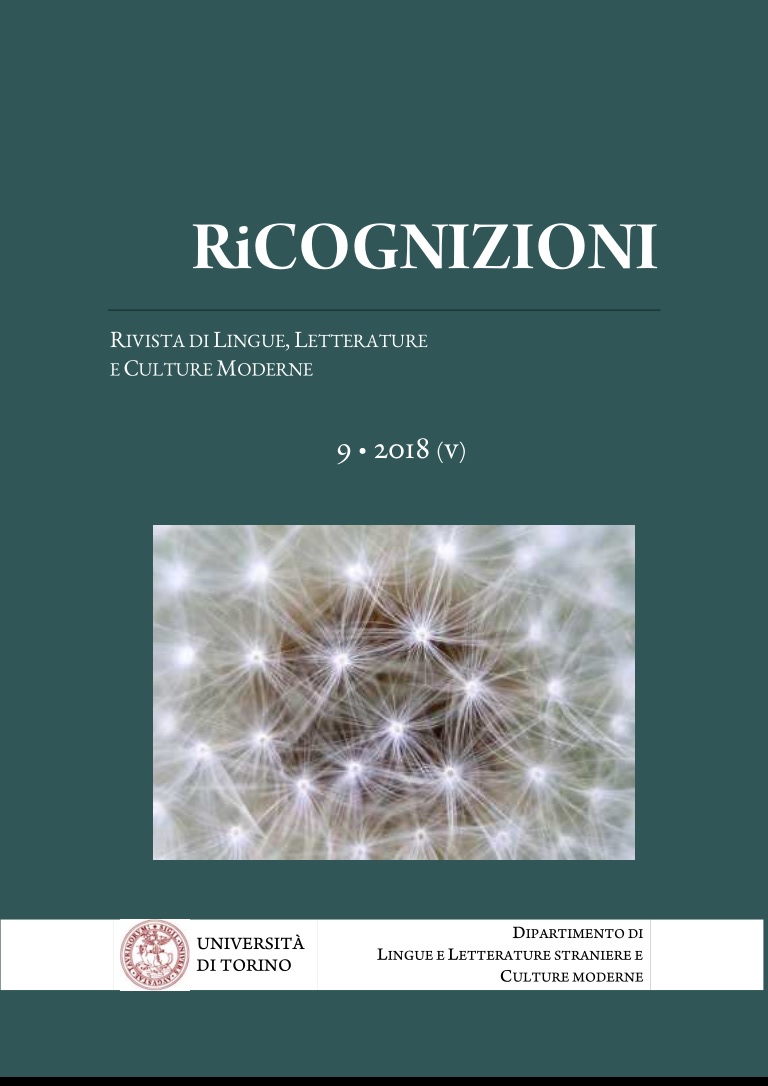E QUESTO IN SOSTANZA È TUTTO. L’AFASIA NELLE OPERE DI DANIIL CHARMS
DOI:
https://doi.org/10.13135/2384-8987/2330Parole chiave:
Daniil Charms, aphasia, empty narration, formal and thematic analys, isAbstract
This study focuses on the analysis of incommunicability in Daniil Charms’s poetics from the thematic point of view, as well as the philosophical and formal one. Thanks to his precision, the scientific language has been chosen to describe these narrative phenomena, avoiding the creation of equivocal neologisms. As a matter of fact, scholars can find a direct and precise connection between Charms’s stylistic choices and the scientific definition of aphasia elaborated by Aleksandr R. Lurija, years before the official codification of the neuropsychological disease. Aphasia has been investigated in a selected range of texts, that includes prose, poetry and drama, analysing the narrative technics and the characters portrait used by the author to fight the silence or to solve a creative block. However, the role of aphasia in Charms’s works doesn’t only show a compositional effect, but it also expresses a form of denounce of the author’s artistic consciousness. Furthermore, an important part of this study is focused on the function of words in human and object existence. In the end, what remains is the writer’s tenacious attachment to life through his voice.
Riferimenti bibliografici
Charms, D. (2008), Casi [1990], a cura di R. Giaquinta, Milano, Adelphi.
Charms, D. (1994), Daniil Charms (v 2 tomach), Moskva, AO “Viktory”.
Charms, D. (2001), Neizdannyj Charms. Polnoe sobranie sočinenii, Sankt-Peterburg, Akademičeskij proekt.
Charms, D. (2015), Polnoe sobranie sočinenii, Sankt-Peterburg, Azbuka.
Charms, D. (2000), Povesty. Rasskazy. Molitvy. Poemy. Sceny. Vodevily. Dramy. Stat’i. Traktaty. Kvasitraktaty, Sankt-Peterburg, Kristall.
Charms, D. (2002), Zapisnye knižki. Dnevnik. V 2 tomach, Sankt-Peterburg, Akademičeskij proekt.
Druskin, Ja. (1993), Vestniki i ich razgovory. Eto i to. Klassifikacija toček. Dviženie, in “Logos”, 4: pp. 91-101.
Borisenko-Svinarskaja, V. (2006), Lingvističeskie nuli u Daniila Charmsa, in Materjaly meždunarodnoj naučnoj konferencii “Daniil Charms: avangard i dejstvija i v otmiranii. K 100 – letiju so dnja roždenija poeta”, Belgrad, Izd-vo filologičeskogo fakul’teta: pp. 165-174.
Carpi, G. (2010), Storia della letteratura russa: da Pietro il Grande alla rivoluzione d’Ottobre, Roma, Carrocci.
Giaquinta, R. (2008), Daniil Charms: prosa senza poesia, in D. Charms, Casi, Milano, Adelphi: 309-336.
Ladavas, E., Berti, A. (2012), Neuropsicologia., Bologna, Il mulino.
Piccolo, L. (2007), Daniil Charms. Il volo e la vertigine, in “eSamizdat” (V) 1-2: pp. 135-151.
Šubinskij V–I. (2015), Daniil Charms: Žizn’ čeloveka na vetru [2008], Sankt-Peterburg, ACT (CORPUS).
Valieva, Ju. (2015), Materjaly k biografii G. N. Kacmana (sledstvennoe delo 1927 goda), in “Russkaja Literatura”, 1: pp. 206-230.
Vitale, S. (1979), Per conoscere l’avanguardia russa, Milano, Mondadori.
Žakkar Ž–F. (1995), Daniil Charms i konec russkogo avangarda [1991], Sankt-Peterburg, Sovremennaja zapadnaja rusistika.
##submission.downloads##
Pubblicato
Come citare
Fascicolo
Sezione
Licenza
Gli autori che pubblicano su questa rivista accettano le seguenti condizioni:- Gli autori mantengono i diritti sulla loro opera e cedono alla rivista il diritto di prima pubblicazione dell'opera, contemporaneamente licenziata sotto una Licenza Creative Commons - Attribuzione che permette ad altri di condividere l'opera indicando la paternità intellettuale e la prima pubblicazione su questa rivista.
- Gli autori possono aderire ad altri accordi di licenza non esclusiva per la distribuzione della versione dell'opera pubblicata (es. depositarla in un archivio istituzionale o pubblicarla in una monografia), a patto di indicare che la prima pubblicazione è avvenuta su questa rivista.
- Gli autori possono diffondere la loro opera online (es. in repository istituzionali o nel loro sito web) prima e durante il processo di submission, poiché può portare a scambi produttivi e aumentare le citazioni dell'opera pubblicata (Vedi The Effect of Open Access).








